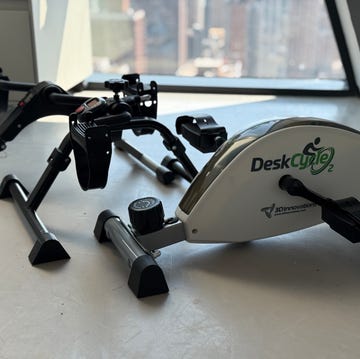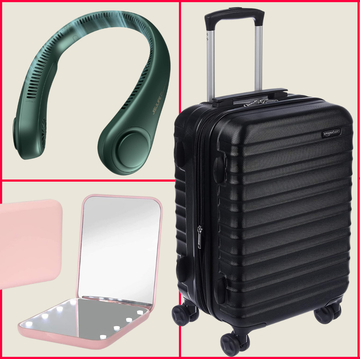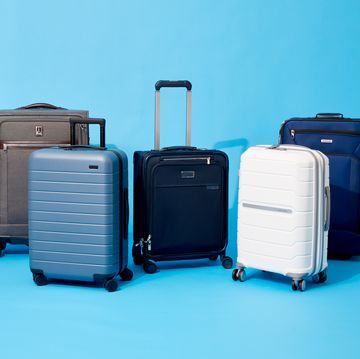The Best Rain Jackets for Men of 2025
Including ultralight packable jackets for hiking adventures and sturdy waterproof picks for heavy rain.

We've been independently researching and testing products for over 120 years. If you buy through our links, we may earn a commission. Learn more about our review process.
If rainy weather is in the forecast, going without a raincoat is a huge gamble. If your current raincoat is beginning to deteriorate or no longer keeps you dry, it's time to upgrade to one of the best rain jackets for men that will wick water away and pack up easily to fit in your backpack or work bag. Paired with one of our top-tested umbrellas, you'll be protected from even the heaviest downpours.
Experts in the Good Housekeeping Institute Textiles, Paper and Apparel Lab evaluate a variety of high-performance clothing from the best raincoats for women to the best running jackets. When testing the best rain jackets for men, we conducted market research on 20 coats from popular brands and called in 11 jackets to evaluate each style in our Lab using our standardized water repellency test. The data collected helped us narrow down top-tested picks that range in style and price.
Pros
Two-way zippers on each side for ventilation
Breathable inner membrane
Three zippered pockets with a built-in key clip
Adjustable drawcords at hood and hemline
Cons
One tester said jacket felt heavier than other styles he has worn
Jackets with an inner membrane are typically top-of-the-line when it comes to waterproofing. In addition to its breathable membrane and durable nylon shell, the Foray 3L offers a secure fit, thanks to helpful drawcords on the hemline and hood. You can zip the welded one-way zipper up to the chin for extra protection from rain. This jacket aced our water-repellency tests, preventing water from soaking through the outer fabric to the inside, meaning you'll stay nice and dry in wet weather.
There is no mesh lining, but the jacket has two-way zippered ventilation that that runs from the armpit to the hem for breathability. One tester who wore a former version of this jacket shared, "It gets crazy humid where I live, especially when it rains, so the zipper vents really help." One tester said it felt heavier and more substantial than other jackets he has worn, but the jacket can be folded down for easy packing, although it doesn't compress into itself.
The external material is soft and also isn't as loud as other raincoats we'll cover elsewhere in this guide. Along with the sturdy shell, we appreciate the built-in key clip and the three zippered pockets for holding small essentials like your phone and wallet.
Sizes: S–XXXL | Material: Nylon with a DWR and breathable membrane | Weight: 13.7 oz

Pros
Sealed seams
Hood stashes into collar when not needed
Comes with its own carrying pouch
Adjustable features at hood, hem and cuffs
Cons
Thinner material than others we tested
We noticed this Amazon brand rising in popularity for its affordable price point so we called it in to see how it performed against jackets from well-known brands. For less than half the price of other top-tested picks, you'll get a rain jacket that's equipped with drawcords at the hood and hem, adjustable cuffs and zippered external and internal pockets. The jacket has sealed seams to prevent rain from seeping in, along with a storm flap covering the zipper for added protection.
We especially like that the drawcords on the hood are hidden for a more streamlined look and that the hood folds down into the collar to stash away until it's needed. Plus, the jacket comes with a travel pouch so you can bunch the entire thing up into a small bundle for easy toting.
It has a 4.5-star rating on Amazon with hundreds of five-star reviews, including several calling it the "perfect rain jacket" and one noting that the jacket "checks all the boxes" for less than $40. We found the 33,000ft rain jacket to be comparable to some other styles we evaluated, but the material is on the thinner side and was a little noisy in testing.
Sizes: S–4XL | Material: Polyester with unspecified water-resistant finish | Weight: Not listed

Pros
Performed well in water-repellency tests
Structured hood with large brim
Pit zippers for breathability
Cons
Loudest rain jacket in our tests
Patagonia is widely recognized for its sustainable practices, from using renewable materials in packaging to minimizing its carbon emissions. We have included its clothing in our guides to sustainable fashion brands and the best eco-friendly products. The Torrentshell is no different in its sustainable production and top performance. Its high-quality design makes for a great waterproof jacket that can be packed down into its own pocket for travel.
Though the material was definitely the loudest in our testing, we were impressed with its technical features and its water-resistant abilities. When we tested water-repellency in the Textiles Lab, beads of water rolled right off the surface of the material, instead of soaking through. The structured hood has a stiff brim with a drawcord in the back, as well as two more cords in the front, for a secure fit. However, one tester said the hood sometimes fell down when he was moving quickly on the trails.
We like the storm flap covering the front zipper and the sealed seams for extra waterproofing. The jacket also has two roomy zippered pockets with soft linings and a built-in key loop. Plus, it has a breathable membrane layer, and you'll appreciate the zippers along the armpits for extra air on particularly sticky days. Our tester who wears his jacket on morning hikes in California shared, "It helps me to stay cool and dry."
Sizes: XS–3XL | Material: Recycled nylon and partially biobased polyurethane with a DWR and breathable membrane | Weight: 14.1 oz

Pros
Spacious exterior pockets with zippers
Tester said jacket felt lightweight and breathable
Roomy fit is ideal for layering
Cons
No mesh lining or vents
If you hike or climb, you have likely seen a colorful Cotopaxi travel pack along the trail or at the gym. We love the brand's outerwear, including the Cielo Men's Rain Jacket, just as much as its backpacks. The jacket is made of polyester with a DWR for added water repellency, and it features a membrane for breathability.
Even though the jacket doesn't have a mesh lining or vents, one tester shared that it still felt light enough to wear in warmer weather. The material also wasn't as loud as other jackets we tested and had a soft, more substantial feel. A tester added, "The material is extremely lightweight and breathable while at the same time blocking most wind and all rain, unlike some of the other rain jackets that I've tried which seem to stick to you."
The jacket has adjustable cuffs, a storm flap and collar that zips all the way under your chin to prevent any water from getting inside. We were impressed by the three roomy pockets, and our testers appreciated the zippered closures to keep their belongings nice and secure. The roomy fit is ideal for layering and the color-block design is more stylish than most raincoats too, so testers said it wasn't too casual to wear into the office. While the jacket is lightweight and therefore easy to travel with, it doesn't come with a pouch for simplified transport.
Sizes: XS–XXXL | Material: Recycled polyester with a DWR and breathable membrane | Weight: Not listed
RELATED: The Best Backpacks for Travel

Pros
Takes up minimal space in suitcase
Adjustable hem, hood and cuffs
Tester says jacket doesn't ride up
Cons
Material is thicker than other jackets we evaluated
If there's one thing we always recommend bringing on a trip, it's a rain jacket. You never know when the weather will take a turn, and it's better to be safe than sorry and caught in the rain. By design, raincoats are already pretty packable, but some are still easier to pack than others: This jacket folds down into its own mesh pocket, basically turning into its own packing cube to take up minimal space in your suitcase. A tester took this jacket in his carry-on on an Alaskan cruise and was pleased by how convenient it was to bring along.
In addition to its compact size, the Rainfoil Jacket also comes equipped with almost every standout feature you'll need to keep dry. It has a two-layer polyester shell with a DWR finish for added water-repellency, drawcords at the hood and hem, sealed interior seams and Velcro cuffs that our testers loved using to achieve the perfect fit. The hood even folds into the collar for when the sun comes out.
We found the material to be heavier and more substantial than some other jackets we evaluated, but our testers said the jacket was ideal for use in the spring or fall. One 6'1" tester also highlighted the roomier fit, sharing that he could easily layer underneath it. He added, "The length of the jacket is very nice. It hangs a couple of inches over my hips, so it didn’t ride up" when moving around. The brand even offers tall options for even more room.
Sizes: S–XXL with tall options | Material: Polyester with a DWR | Weight: Not listed
RELATED: The Best Packing Cubes

Pros
Drawcord along hem and hood
Made from durable ripstop material
Packs down into itself
Cons
Only one chest pocket and no hand pockets
Not as water-resistant as other styles
Per its name, the Helium Rain jacket from Outdoor Research is indeed ultralight. It was the lightest rain jacket we tested by far, in part because of the simple, no-frills design. Still, the jacket can folds up into itself so you can take it with you anywhere. It's made of nylon ripstop with Pertex Diamond Fuse fibers for added durability.
We did find the fabric to be a little noisy in Lab testing, and the material is on the thinner side, so it didn't perform as well as other jackets in our water-repellency evaluations. It soaked through more quickly than some of the other materials we tested, so we wouldn't recommend this pick for heavy rain. According to testers, it's particularly helpful for runs on windy, misty days.
The jacket includes drawcords at the hem and the back of the hood for a secure fit that will help keep the rain out. We like that the hood also has a structured brim so it will hold its shape in the rain or wind. Note that there is only one external pocket, and it's at the chest which doesn't allow much storage, but it does have a built-in key loop. Given the lack of extra features, it comes in at a lower price than our best overall pick from Outdoor Research, but it is still pricier than other styles we've tested.
Sizes: XS–XXXL | Material: Nylon | Weight: 7.05 oz

Pros
Highest water-repellency scores in our tests
Testers said it blocked wind and rain
Snaps on cuffs and storm flap for added protection
Cons
Runs warmer than other jackets, according to testers
Stocked in classic yellow, versatile navy, olive green and camouflage, this raincoat by Helly Hensen stood out in our tests for its waterproof design. The true fisherman's style rain jacket earned the highest scores in our water-repellency tests, completely blocking water from soaking through the material to the inside of the jacket. In addition to the waterproof material, the jacket has welded seams and a double front closure including a zipper covered by a storm flap with silver snaps. Flap pockets with snaps also ensure your belongings don't get wet. Testers were impressed by the sturdy jacket and said it helped to block both wind and rain.
While there is no mesh lining, there is a vent with small holes in the back for a little bit of breathability on a wet, humid day. It's heavier and bulkier than other styles we tested and has a rubber-like texture, comparable to a pair of rain boots. Testers said they prefer wearing this jacket during cooler wet weather because it's too stuffy for warmer days. One tester shared, "It is not breathable enough for hiking, and I get too hot wearing it when it’s hot out."
Sizes: S–2XL | Material: Polyurethane | Weight: Not listed

Other men’s rain jackets we tested

Of the 11 men's rain jackets we tested in Lab, we chose our top seven coats to feature — but that doesn't mean the other raincoats we evaluated don't deserve a mention. Here's what we liked and what we didn't like about them.
- Columbia Men's Watertight II Jacket: This very lightweight and packable jacket has all the features of a solid rain jacket, including an adjustable hood, mesh lining and external pockets. It also includes drawstrings for a personalized fit and a double closure along the zipper. That said, we found the thin material to be rather loud in testing and wished the price were a bit lower given its simpler design.
- REI Co-op Men's Rainier Rain Jacket: While REI sells a lot of outerwear brands included in this round-up, it also has its own line of clothing. This raincoat is a popular pick on the brand's site. We like that its membrane is made from durable nylon ripstop and that it has pit zips. The jacket is also an affordable buy at under $100. We haven't tested it in Lab yet but are looking forward to evaluating it as part of our ongoing testing of the category.
- Duluth Men's No-Rainer Jacket: This heavy-duty rain jacket meets all the core requirements of a great jacket for a reasonable price at under $125. We like the functional design, including a structured and adjustable hood, two-way pit zips for breathability and secure pockets — to name just a few features. But we took off points for its loud and almost rough outer material and wished it were easier to pack.
- The North Face Men's Antora Jacket: Popular for its fuzzy zip-up jackets, The North Face is also a go-to for raincoats. The Antora has more than 1,000 online reviews and is designed to be waterproof, windproof and breathable — a triple threat! It has cords on the hood and hemline for adjustability as well as a storm flap with a hook-and-loop closure. This is another style we hope to evaluate in Lab and send out to our consumer testers.
- Arc'teryx Beta AR Jacket Men's: Arc'teryx stores have been popping up left and right — and you may have seen its logo on the arm of commuters' jackets. While the brand is an excellent choice if you're looking for a top-performing rain jacket to keep you dry and warm on trails or mountaineering adventures, it comes at a hefty cost. Its price is the main reason we didn't include a raincoat from the brand, although if you have the budget and want to invest in a piece of gear — this is it.
How we test the best rain jackets for men

In the Good Housekeeping Institute Textiles, Paper and Apparel Lab, we first reviewed rain jacket testing data to decide which jackets had performed well in the past. Then, we researched popular rain jackets online and called in 11 jackets to review in person. We also shared rain jackets with consumer testers to gather long-term feedback on characteristics such as overall fit, comfort, washability and more.
In the Lab, we considered the overall construction of the rain jackets, inspecting aspects like the materials used and the seams and stitching. We also considered the noise level produced by each rain jacket. In addition, we noted standout features such as the ability for the rain jacket to pack into its own pocket, adjustable elements like drawcords and snaps, as well as breathable membranes.

To test water repellency, we evaluated each raincoat in the Textiles Lab using our in-house rain tester. We first weigh blotting paper and attach it to the back of the rain tester and then place a swatch of rain coat material on top of the blotting paper. Next, the rain tester sprays a continuous stream of water at a set pressure and temperature for five minutes, wetting the rain jacket material (pictured here). Once the cycle is completed, we remove the jacket material and reweigh the blotting paper. The more the blotting paper weighs, the more water has soaked through the material, proving that it's not entirely water-repellent.
What to look for when shopping for the best men’s rain jackets

✔️ Fibers: Almost every rain jacket on the market is made from synthetic fibers such as nylon or polyester because they are hydrophobic (i.e., repel water), durable and easy to clean. While these fibers excel at keeping you dry, they don't offer as much breathability.
✔️ Material: Rain jackets are typically made with performance weave fabrics or ripstop, a high-strength material that’s able to resist wear and tear. High-tech jackets will also feature a membrane — a thin material that’s porous and allows for sweat vapor to escape but prevents water droplets from passing through.
✔️ Water repellency: Raincoats may also feature a chemical finish or coating that is applied directly to the material to improve the jacket's ability to repel moisture. Some examples are DWRs or polyurethane, in addition to waxes, oils and silicones. One thing to note is that these coatings and finishes will break down over time, but you can reapply finishes to help make the jacket last longer.
✔️ Ventilation: As previously mentioned, rain jackets don't always have the best breathability because they are made from synthetic fibers, but some coats have zippered ventilation systems under the armpits or throughout the torso to improve airflow. Mesh paneling and lining is another design feature that can help improve breathability.
✔️ Weather-proof design: In addition to everything mentioned above, there are some extra features that can be game-changers when you're caught in a bad rainstorm. One is a double-front closure that combines a zipper wither either snaps or a hook-and-loop element or a storm flap covering the zipper to provide extra protection. You may also see a more structured hood that has a brim and adjustability features to help keep rain out of your line of sight. Adjustable hems and cuffs can provide an even more secure fit while yokes or extra panels of fabric covering the chest and back allow water to roll away from the body to keep you dry.
✔️ Packability: While packing up your raincoat into a tight roll may not be your top priority, it's something to keep in mind if you hike, travel or have limited closet space. Some raincoats will come with a convenient pouch or will fold down into a pocket. If neither of those apply, try folding your coat into its hood.
What is the difference between a water-resistant jacket and a waterproof jacket?

The two terms are sometimes used interchangeably, but the slightly different wording can impact the performance of your raincoat. Rain jackets labeled water-resistant will protect you from the rain for a certain amount of time, but the material will eventually soak, leaving you wet. These jackets are great for daily use in light rain showers, but they aren't as effective in downpours.
Meanwhile, waterproof jackets will help you to stay as dry as possible because they’re made with material that’s able to withstand extended exposure to heavy rain. They'll often feature welded or sealed seams and covered zippers for even more protection and won't soak through as easily as a water-resistant jacket.
Are PFAS in my rain jacket and should I worry?

PFAS, or Per- and Polyfluoroalkyl Substances, are commonly referred to as "forever chemicals," and they're found in everything from clothing like a rain jacket to nonstick cookware, but they also exist in our drinking water. PFAS don't break down easily and can ultimately enter our bloodstreams with repeated exposure, which may result in health complications, explains Nicole Deziel, Ph.D., MHS, associate professor of epidemiology in environmental health sciences at Yale School of Public Health.
Until recently, it wasn't uncommon for rain-gear brands to incorporate PFAS into their DWRs (Durable Water Repellents), which help improve the gear's waterproofing. In January of 2025, New York banned the sale of most apparel containing intentionally added PFAS. Outdoor apparel including rain jackets are exempt from this ban until 2028, but many outdoor gear brands have already begun moving away from using PFAS in their raincoats in reaction to the ban, and California and Colorado are beginning to place their own restrictions and bans on the chemicals.
If you think your raincoat may contain PFAS, Dr. Deziel shares that you may not necessarily need to get rid of it. “A PFAS-containing raincoat typically doesn’t come into direct contact with your skin, as it's worn over other clothing." She adds, "If you were to throw it away, then it contributes to waste and PFAS in landfills, so while it's worth considering for future purchases, if you already own a water-resistant raincoat, you may want to wear it as long as possible to reduce environmental impact.”
READ OUR FULL EXPLAINER HERE: PFAS Bans for Clothing
Elizabeth Berry (she/her) is the Updates Editor at the Good Housekeeping Institute where she optimizes lifestyle content across verticals. Prior to this role, she was an Editorial Assistant for Woman’s Day where she covered everything from gift guides to recipes. She also has experience fact checking commerce articles and holds a B.A. in English and Italian Studies from Connecticut College.
Amanda (she/her) researches and reports on products in the Good Housekeeping Institute's Textiles, Paper & Apparel Lab, ranging from clothing and accessories to home furnishings. She holds undergraduate degrees in apparel merchandising and product development and advertising and marketing communications, as well as a master of science degree in consumer sciences from The Ohio State University. Prior to joining Good Housekeeping in 2022, Amanda was a lecturer for the fashion and retail studies program at Ohio State, where she taught fashion and textiles courses.

Readers Also Read

The Best Under-Desk Bikes

Don't Go Without These Amazon Travel Items

What to Know About 'Sullivan's Crossing' Season 4

35 Toddler Movies the Whole Family Will Also Enjoy













